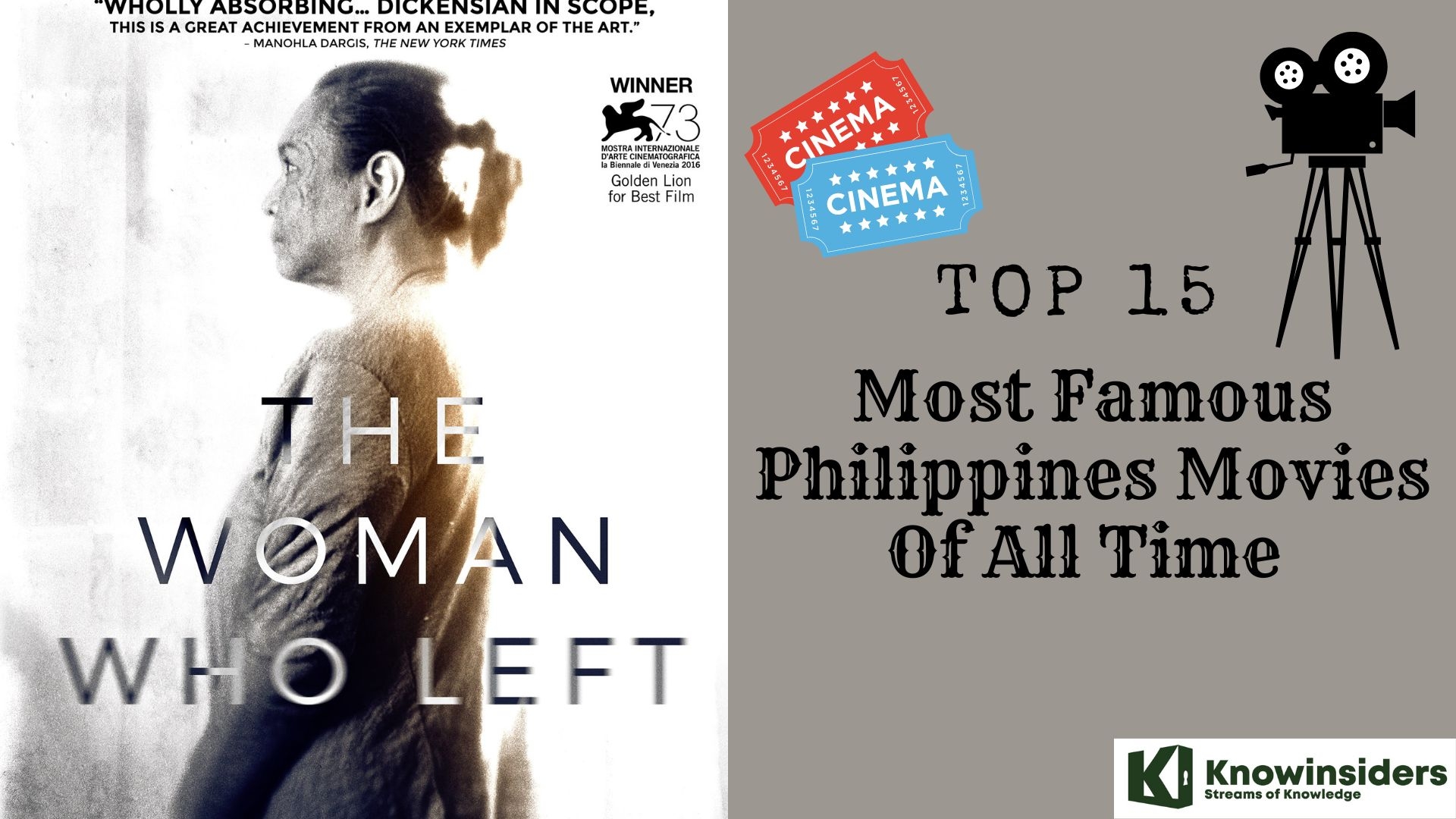Top 15+ Best Websites To Get Trusted Health Advices
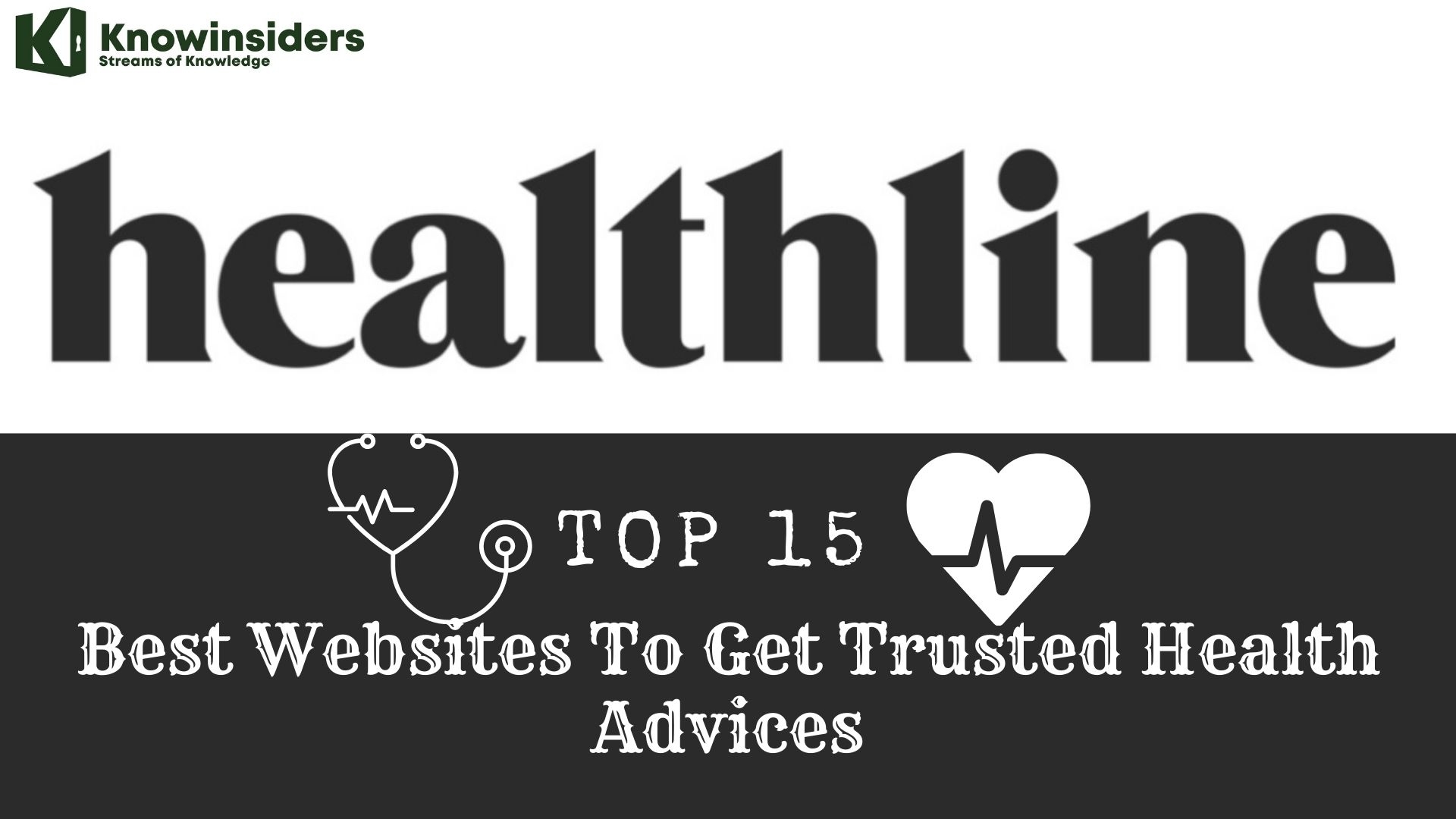 |
| Top 15+ Best Websites To Get Trusted Health Advices |
Getting in shape isn’t easy. It takes a lot of research, time, and long-term commitment. If you’ve been searching for fitness websites to get accurate health advice, then you know that there’s a whole lot of misinformation out there.
A successful website is one that presents your particular message clearly and efficiently. Users need to be able to find what they want easily with a minimum amount of scrolling and clicking, and the overall design should be logical. No matter what your message is or how you are selling it, you won’t reach your target audience without a well-designed website that is engaging and easy to navigate.
Here are the 15 best websites that you can have the most accurate health advices and information.
How reliable is online health information?
The internet has created a revolution in how we access health information and, increasingly, healthcare. But it can be difficult to tell the difference between reliable online health information and medical information that’s not just wrong, but potentially harmful. With nearly two-thirds of Brits turning to Dr Google before a healthcare professional, the reliability of health websites and app content is vital. So, exactly how trustworthy is consumer health information and how can we even tell what’s credible and what isn’t?
What is the need for reliable health information online?
Health at our fingertips: in theory, this level of easy availability and control for users can be positively life-changing, especially in a pandemic or post-pandemic world. But, just as the internet can empower people with the right information, it can also do the opposite. This is a particular concern for those already feeling vulnerable and desperate for a solution to their health problems.
There is no doubt that a wealth of great information, websites and digital tools exist that enable people to take greater control of their health and empower them with the right information. But the amount of unreliable or even harmful information that exists has led to the internet being a wild west of health advice.
Anyone with basic knowledge and funds can set up a site full of seemingly credible medical advice that looks more authoritative than many official medical sites. And, with social media promotion knowhow they can deliver their content straight into the hands of an unsuspecting target audience.
This wouldn’t be such an issue if we weren’t so susceptible to believing unreliable online health information. Many studies point to internet users trusting fake information online without too much questioning.
And a recent survey found that Brits actively search for health information over seeking advice from a clinician and healthcare provider. This can potentially lead to not only misdiagnoses but anxiety over non-existent health conditions.
What is being done to ensure the reliability of health websites?
It is because of concerns over misleading or downright fake health information that Google is reforming its search ranking algorithm. In a bid to protect the public from wild west cowboys, the world’s most popular search engine aims to put the most trustworthy physical and mental health information sites at the top of its results.
Google is focusing on what it terms ‘your money or your life’ (YMYL) sites to determine page quality in terms of their criteria of expertise, authority and trustworthiness (EAT). This is because sources of health information and sites relating to finance, wellbeing and safety have the biggest potential to have a negative influence on users.
Social media sites like Facebook are now also actively trying to detect misleading information. But caution is still advised when looking for information online, especially when it comes to health.
Finding reliable information about health on the net
Despite the cautionary notes, the internet can be a great resource for health information with a number of reliable, accurate and easily understood health resources. With Google’s EAT criteria in mind, users can examine any health-related information they find for expertise, authority and trustworthiness themselves, by asking these simple questions:
Who?
The first question relates to attribution, specifically whether any health-related information is backed up by medical evidence and/or approved by medical professionals or experts. Many reliable online resources cite their scientific sources at the bottom of a page and state if an expert has reviewed and approved the healthcare information.
Why?
Related to the question of ’Who?’ is the necessity for users to examine the intent of online health resources. Support groups can be beneficial but beware of unmonitored opinions on health topics. Is the site purely or mainly a selling tool? This is a particular pitfall with dietary advice sites. Users of these are bly advised to find out whether they’re being sold supplements or a diet programme. Compare the intent of a commercial diet site with a site like the NHS or any gov.uk site – or, in the US, a site like the National Institutes of Health (NIH) – whose purpose is to communicate public health advice.
When?
It’s also key to find out when the health information or its sources were written, reviewed or updated. If nothing else, the Covid-19 pandemic has shown us how rapidly what we know about health and medicine changes. In any context, scientific research is constantly updated. Older research can be immensely valuable but it’s always wise to check if there is anything that is more up to date.
What is the future of online health information?
While misplaced trust in inaccurate health information is an issue, the public treat the internet very differently in 2021 compared to even a few years ago. There is a growing tendency to view online sources with caution and an awareness that online health information requires interrogation.
More and more people are using guidance like the steps outlined above to ensure that the online health advice they’re consuming is accurate, up to date and relevant to them. This kind of critical thinking around online information is only set to increase as awareness grows. Meanwhile self-regulation by tech companies like Google and Facebook improves.
What are the best websites to get trusted health advices?
1. WebMD
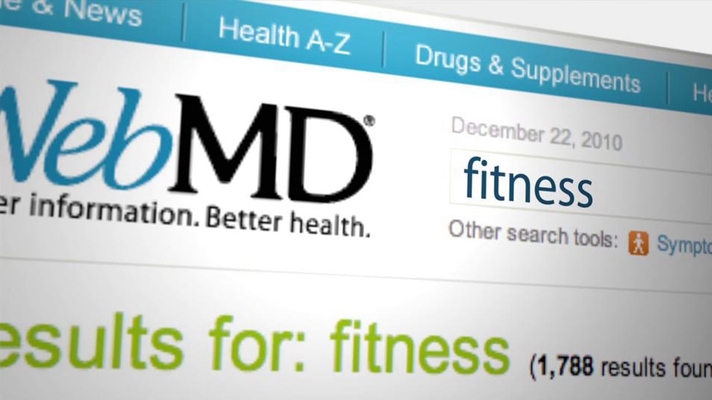 |
| Photo: Healthcare IT News |
WebMD is an American corporation known primarily as an online publisher of news and information pertaining to human health and well-being. The site includes information pertaining to drugs. It is one of the top healthcare websites.
It was founded in 1998 by internet entrepreneur Jeff Arnold. In early 1999, it was part of a three way merger with Sapient Health Network (SHN) and Direct Medical Knowledge (DMK). SHN began in Portland, Oregon, in 1996 by Jim Kean, Bill Kelly, and Kris Nybakken, who worked together at a CD-ROM publishing firm, Creative Multimedia. Later in 1999, WebMD merged with Healtheon, founded by Netscape Communications founder James H. Clark.
WebMD is a comprehensive medical app that is a companion to the WebMD website. Aimed at the general public, users can find information on drugs, medical conditions, and a variety of other medical and lifestyle topics.There are different versions for iPhone and iPad with some additional features available in the iPhone app that are not found on the iPad.
WebMD is best known as a health information services website, which publishes content regarding health and health care topics, including a symptom checklist, pharmacy information, drugs information, and blogs of physicians with specific topics, and provides a place to store personal medical information. URAC, the Utilization Review Accreditation Commission, has accredited WebMD's operations continuously since 2001 regarding everything from proper disclosures and health content to security and privacy.
The company reported $705 million in revenue for the year 2016. In 2017, Internet Brands, a company owned by private equity firm Kohlberg Kravis Roberts (KKR) agreed to purchase WebMD Health Corporation for approximately $2.8 billion.
During March 2020, WebMD's network of websites reached more unique visitors each month than any other leading private or government healthcare website, making it the leading health publisher in the United States. In the fourth quarter of 2016, WebMD recorded an average of 179.5 million unique users per month, and 3.63 billion page views per quarter. In the first quarter of 2020, WebMD received approximately 127 million unique users viewing over 229 million page views per month.
2. NIH
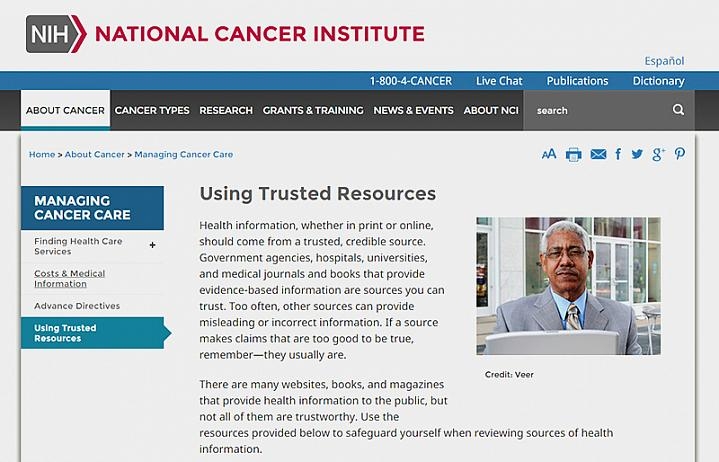 |
| Photo: NIH News in Health |
The National Institutes of Health is the primary agency of the United States government responsible for biomedical and public health research. It was founded in the late 1880s and is now part of the United States Department of Health and Human Services. The majority of NIH facilities are located in Bethesda, Maryland, and other nearby suburbs of the Washington metropolitan area, with other primary facilities in the Research Triangle Park in North Carolina and smaller satellite facilities located around the United States. The NIH conducts its own scientific research through the NIH Intramural Research Program (IRP) and provides major biomedical research funding to non-NIH research facilities through its Extramural Research Program.
As of 2013, the IRP had 1,200 principal investigators and more than 4,000 postdoctoral fellows in basic, translational, and clinical research, being the largest biomedical research institution in the world, while, as of 2003, the extramural arm provided 28% of biomedical research funding spent annually in the U.S., or about US$26.4 billion.
The NIH comprises 27 separate institutes and centers of different biomedical disciplines and is responsible for many scientific accomplishments, including the discovery of fluoride to prevent tooth decay, the use of lithium to manage bipolar disorder, and the creation of vaccines against hepatitis, Haemophilus influenzae (HIB), and human papillomavirus (HPV).
In 2019, the NIH was ranked number two in the world, behind Harvard University, for biomedical sciences in the Nature Index, which measured the largest contributors to papers published in a subset of leading journals from 2015 to 2018.
Thanks in large part to NIH-funded medical research, Americans today are living longer and healthier. Life expectancy in the United States has jumped from 47 years in 1900 to 78 years as reported in 2009, and disability in people over age 65 has dropped dramatically in the past 3 decades. In recent years, nationwide rates of new diagnoses and deaths from all cancers combined have fallen significantly.
NIH’s mission is to seek fundamental knowledge about the nature and behavior of living systems and the application of that knowledge to enhance health, lengthen life, and reduce illness and disability.
The goals of the agency are:
- to foster fundamental creative discoveries, innovative research strategies, and their applications as a basis for ultimately protecting and improving health;
- to develop, maintain, and renew scientific human and physical resources that will ensure the Nation's capability to prevent disease;
- to expand the knowledge base in medical and associated sciences in order to enhance the Nation's economic well-being and ensure a continued high return on the public investment in research; and
- to exemplify and promote the highest level of scientific integrity, public accountability, and social responsibility in the conduct of science.
In realizing these goals, the NIH provides leadership and direction to programs designed to improve the health of the Nation by conducting and supporting research:
- in the causes, diagnosis, prevention, and cure of human diseases;
- in the processes of human growth and development;
- in the biological effects of environmental contaminants;
- in the understanding of mental, addictive and physical disorders; and
- in directing programs for the collection, dissemination, and exchange of information in medicine and health, including the development and support of medical libraries and the training of medical librarians and other health information specialists.
3. Academy of Nutrition and Dietetics
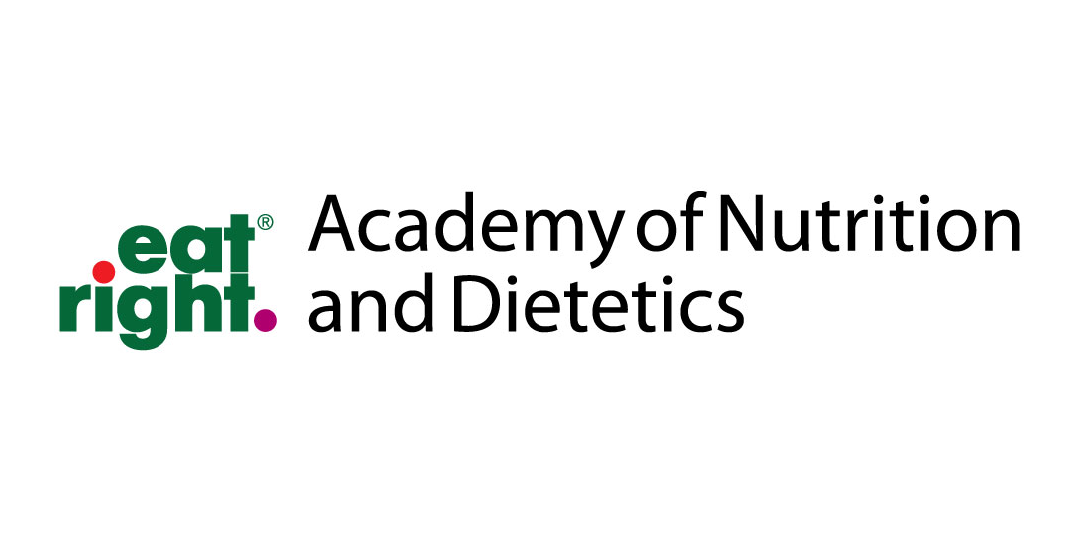 |
| Photo: eatrightmemphis.org |
Eatright.org is a website published by The Academy of Nutrition and Dietetics. This academy was first founded in Cleveland, Ohio in 1917 and represents over 112,000 nutritional experts worldwide.
The dietary information you find there can be trusted because the academy members are professionals throughout the nutritional industry, including experts in disease prevention and wellness. The academy even provides testimony at government hearings dealing with public health.
The only downside to this organization is that they do receive food industry funding, including from the National Cattlemen’s Beef Association and the Egg Nutrition Center. So when it comes to articles promoting eating products like these, take it with a grain of salt.
Top features:
- Includes website sections on Food, Health, and Fitness
- Contributions from credentialed health and medical experts
- Doesn’t promote any specific dietary plan, only healthy food choices
- Includes a section with healthy recipes
4. Healthline
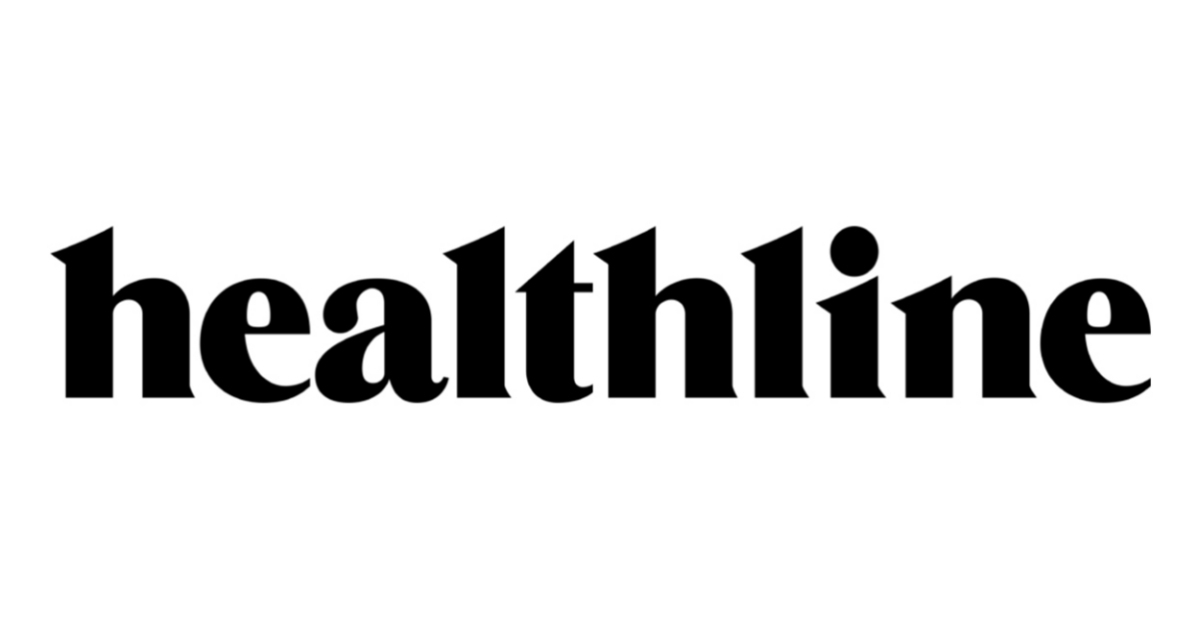 |
| Photo: Business Wire |
Healthline if one of the leading providers of medical and health related information on the internet. Founded in 2006, Healthline has grown to become the fastest growing health information website with over 85 million visitors ever month.
Healthline is privately owned and has its headquarters in San Francisco, California. The company was founded earlier in 1999 by endocrine specialist Dr. James Norman as YourDoctor.com but was later relaunched as Healthline Networks in 2006.
By 2013, the company had a yearly revenue of over $21 million and had 105 employees. The CEO of Healthline Media, David Kopp, has a 25-year career that spans publishing, consumer services, digital advertising, and client side marketing.
Having worked for both Yahoo and Disney in the past, David believes that everyone needs education, better tools, and support in order to live a healthy life and he believes Healthline Media has everything it takes to provide exactly that to the visitors.
Healthline as a Business
According to Deloitte rankings, Healthline Media is among the top 500 fastest growing tech companies in North America.
Even though the company receives funding from many donors amounting to millions, the company maintains that none of the donors have an influence over the information shared to the public through the website.
Healthline is the go-to place for people looking to learn more about various diseases, people looking for tips on how to live a healthier lifestyle, people doing research on various types of medication, or even people looking for communities or online support groups to join.
Healthline is known for content that is informative, engaging, easy to understand, and accurate.
Healthline’s Editorial Team
Healthline’s Medical Affair team is focused on ensuring Healthline’s products, content, and services uphold high standards of medical integrity.
Covering the full spectrum of health and medicine, Healthline’s doctors, nurses, patient advocates, and public health experts help ensure that all the information you receive on Healthline.com is factual, accurate, current, evidence-based, and trustworthy.
Healthline also provides communities for people with various health conditions to meet, have online discussions, and help each other cope as well as share information on how to manage the diseases better.
Currently, Healthline is managing over 21 online chronic disease communities with more than 421,000 patient influencers.
Healthline’s main mission is to be the most trusted ally for people in pursuit of health and general well-being.
The company is committed to providing its visitors with approachable, authoritative, and actionable content that guides and inspires people towards achieving the best possible health outcomes.
5. Mayo Clinic
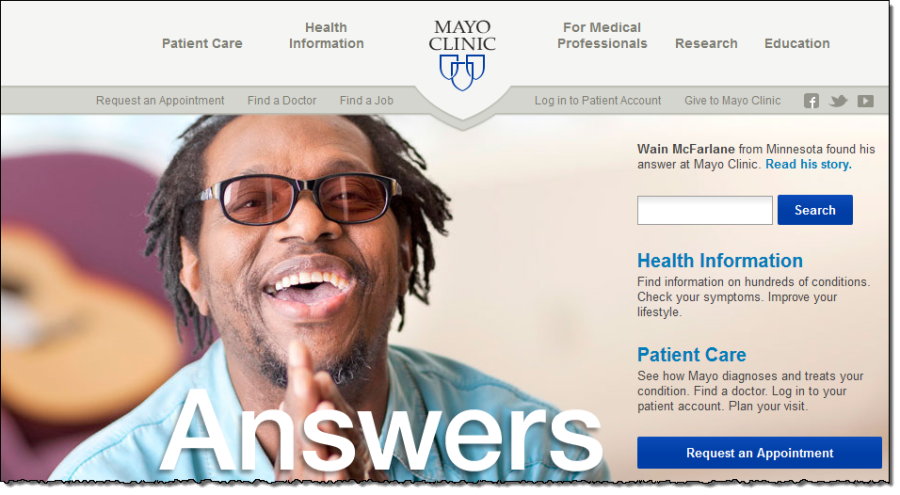 |
| Photo: Screenshot |
The Mayo Clinic is a nonprofit American academic medical center focused on integrated health care, education, and research. It employs over 4,500 physicians and scientists, along with another 58,400 administrative and allied health staff, across three major campuses: Rochester, Minnesota; Jacksonville, Florida; and Phoenix/Scottsdale, Arizona. The practice specializes in treating difficult cases through tertiary care and destination medicine. It is home to the top-15 ranked Mayo Clinic Alix School of Medicine in addition to many of the highest regarded residency education programs in the United States. It spends over $660 million a year on research and has more than 3,000 full-time research personnel.
William Worrall Mayo settled his family in Rochester in 1864 and opened a sole proprietorship medical practice that evolved under his sons, Will and Charlie Mayo, along with practice partners Stinchfield, Graham, Plummer, Millet, Judd, and Balfour, into Mayo Clinic. Today, in addition to the hospital at Rochester, Mayo Clinic has major campuses in Arizona and Florida. Most recently, in 2020, the Mayo Clinic bought a facility in central London, UK. The Mayo Clinic Health System also operates affiliated facilities throughout Minnesota, Wisconsin, and Iowa.
Mayo Clinic has ranked number one in the United States for six consecutive years in U.S. News & World Report's Best Hospitals Honor Roll, maintaining a position at or near the top for more than 35 years. It has been on the list of "100 Best Companies to Work For" published by Fortune magazine for fourteen consecutive years, and has continued to achieve this ranking through 2017. Drawing in patients from around the globe, Mayo Clinic performs near the highest number of transplants in the country, including both solid organ and hematologic transplantation.
From 2016 to 2021, Mayo Clinic, Rochester, was ranked as the #1 overall hospital in the United States by U.S. News & World Report. A total of almost 5,000 hospitals were considered and ranked in 16 specialties from cancer and heart disease to respiratory disorders and urology; 153 (just over 3 percent of the total) were ranked in at least one of the 16 specialties. Of the 153 hospitals that are ranked in one or more specialties, 20 qualified for the Honor Roll by earning high scores in at least six specialties. Mayo Clinic, Rochester, was ranked in the top 10 in all but one of 16 specialties, in the top 4 in 13 specialties, and was the #1 ranked hospital in 8 of the 12 data-driven specialties. This year U.S. News expanded their common procedures and conditions list to 9 individual measures, and Mayo was one of fewer than 70 hospitals to score High Performing in every category. Additionally, Mayo was the only hospital on the 2016–2017 honor roll to also receive 5 stars from CMS. Every Mayo Clinic hospital received an "A" safety rating from Leapfrog in its April 2017 report. In 2021–22, Mayo Clinic, Rochester, was ranked again as the #1 overall hospital in the United States by U.S. News & World Report.
6. Epocrates
 |
| Photo: Epocrates |
Epocrates is a well-known web-service and mobile application used by healthcare professionals. The service initially grew in popularity as a pharmacology reference but more recently has expanded to include a variety of medical reference materials. From medical calculators to adult and pediatric reference tables, the application today spans a large variety of clinical decision support tools.
Purpose/Features/Content
Expectedly, the free version of Epocrates centers on pharmacology. Most healthcare providers trained in the past decade or experienced practitioners with tech-savvy will be readily familiar with the service. Epocrates is a reliable, comprehensive, and easily navigable service for looking up information about medications: uses, dosing, contraindications, reactions, interactions, pregnancy, pharmacology, and more. The search function works well and is forgiving for the poor speller. With a finger tap, information from a given category can be expanded or one can easily navigate through linked keywords to other medications or diseases.
The professional version includes a cornucopia of decision support tools, including disease information, support for alternative medicines, infectious disease treatment, and laboratory panels and normal values. A large wealth of information is offered in a concise manner, including basic information including such as history and exam findings but also approach to diagnostic confirmation and treatment. It appears the developers took considerable effort to include as many references and calculators as possible without reaching into the obscure. The authors were frequently impressed with the amount of functionality provided. Please refer to the figures for further understanding of the application content.
Note should be made that the general radiologist is unlikely to get much use from this application unless she is directly interacting with patients on a daily basis or frequently prescribing medications.
Usability
The UI is clean and professional. The user interface is excellent and works exactly as one would expect. The main menu provides an attractive overview of the app’s content, spanning three (free version) or four (pro) pages. As mentioned above, information is easily accessible via the application’s “search” function. One level deep, information is presented in either bullet points or other shorthand. In the authors’ estimation, this format compares favorably with competitor education apps such as Up-to-Date in which information is given in paragraph form.
Pros
Medication information and some reference material are easily accessible. Application interface is readable with a user-friendly layout. Reliable and ad-free user experience with the ability to work offline.
Cons
Although a free version provides a wealth of information, premium membership allows access to additional material including illness scripts, ICD codes, reference laboratory values, and differential diagnoses.
7. MedicineNet
MedicineNet is an American medical website that provides detailed information about diseases, conditions, medications and general health. The website MedicineNet.com was launched in 1995.
William Shiel co-founded MedicineNet and continues today as the Chief Medical Editor.
Melissa Stöppler also serves on the MedicineNet Editorial Board.
Stoppler and Shiel were co editors-in-chief of Webster's New World Medical Dictionary, Year 2008, Third Edition.
MedicineNet is an owned and operated site in the WebMD Consumer Network, and was acquired by WebMD in December 2004.
MedicineNet is a network of U.S. Board-Certified Physicians and Allied Health Professionals working together to provide the public with current, comprehensive medical information, written in easy to understand language.
MedicineNet, as part of the WebMD Consumer Network, adheres to the same privacy policy as WebMD.com, and is certified by the TRUSTe online privacy certification program.
In addition, MedicineNet is HONcode certified to be in compliance with the Health on the Net health website principles.
MedicineNet is ranked #5 in the July 2017 eBizMBA Top 15 Most Popular Health Websites.
8. Everyday Health
Everyday Health Group is a digital media company which owns websites and produces content relating to health and wellness for consumers and medical professionals. For consumers, its brands include Everyday Health, Diabetes Daily, Migraine Again, DailyOM, What to Expect, BabyCenter, and Emma’s Diary. Its brands for professionals include Health eCareers, Prime Medical, MedPage Today, and Castle Connolly. Everyday Health Group is a division of the Ziff Davis media and internet conglomerate.
Everyday Health has a consumer rating of 3.2 stars from 10 reviews indicating that most customers are generally satisfied with their purchases. Everyday Health ranks 65th among Health Information sites.
The company was founded in 2002 by entrepreneurs Benjamin Wolin and Michael Keriakos to invest in the creation of online health content for major "offline" health brands. At the time, it was known as Agora Media. It merged with Streetmail.com to become Waterfront Media.
In October 2008, the company announced that it would merge with Revolution Health, in a deal valued at $300 million. The combined company, operating under the Waterfront Media name, was projected to have $100 million revenue in 2009, double its 2007 revenue.
In 2010, the company changed its name to Everyday Health. The company attempted an IPO in November 2010, which ultimately failed due to changes in “circumstances regarding the securities markets.” In December 2010, Everyday Health acquired professional website MedPage Today.
In 2018, EHG acquired the medical continuing education and research company Prime Medical. The next year, it acquired Castle Connolly, a ratings website for healthcare facilities and providers. Castle Connolly publishes the Top Doctor series, including annual awards for the peer-nominated “America’s Top Doctors.” It also purchased the pregnancy and parenting website BabyCenter from Johnson & Johnson that year. It joined What to Expect as part of the Everyday Health Pregnancy and Parenting division.
In 2020, Everyday Health Group acquired the patient advocacy and community site Migraine Again, for people living with migraines and chronic headaches. The following year, Everyday Health Group brought two more new sites into its portfolio: Diabetes Daily and DailyOM.
Diabetes Daily is a patient community and advocacy site, DailyOM offers courses in holistic living and self-improvement, inspirations, and horoscopes. At the beginning of 2022, EHG acquired Emma’s Diary, a UK-based company that offers baby and parenting advice, as part of a larger purchase of the company Lifecycle Marketing Ltd. Everyday Health Group has also maintained a partnership with the Mayo Clinic for over a decade.
9. MedlinePlus
MedlinePlus is an online information service produced by the United States National Library of Medicine. The service provides curated consumer health information in English and Spanish with select content in additional languages. The site brings together information from the National Library of Medicine (NLM), the National Institutes of Health (NIH), other U.S. government agencies, and health-related organizations. There is also a site optimized for display on mobile devices, in both English and Spanish. In 2015, about 400 million people from around the world used MedlinePlus. The service is funded by the NLM and is free to users.
MedlinePlus provides encyclopedic information on health and drug issues, and provides a directory of medical services. MedlinePlus Connect links patients or providers in electronic health record (EHR) systems to related MedlinePlus information on conditions or medications.
PubMed Health is another NLM site that offers consumer health information, in addition to information for health professionals.
The National Library of Medicine has long provided programs and services for professional medical scientists and health care providers, including MEDLINE and the various services that access it, such as PubMed and Entrez. By the 1990s, more members of the general public were using these services as Internet access became widespread. But nonprofessional users could benefit from reliable health information in a layperson-accessible format. The National Library of Medicine introduced MedlinePlus in October 1998, to provide a non-commercial online service similar, for example, to the commercial WebMD. In 2010 another NCBI service, PubMed Health, complemented MedlinePlus in offering curated consumer health information; PubMed Health focuses especially on finding information about clinical effectiveness of treatments.
MedlinePlus initially provided 22 health topics in English, which expanded to almost 1000 health topics in English and Spanish, plus links to health information in over 40 languages. MedlinePlus was recognized by the Medical Library Association for its role in providing health information. The site scored 84 in the American Customer Satisfaction Index for 2010.
In 2000s, A.D.A.M.'s medical encyclopedia was incorporated into MedlinePlus. The "Animated Dissection of Anatomy for Medicine, Inc." is a NASDAQ-traded public company based in Atlanta, Georgia, that provides consumer health information and benefits technology products to healthcare organizations, employers, consumers, and educational institutions.
10. HealthGrades
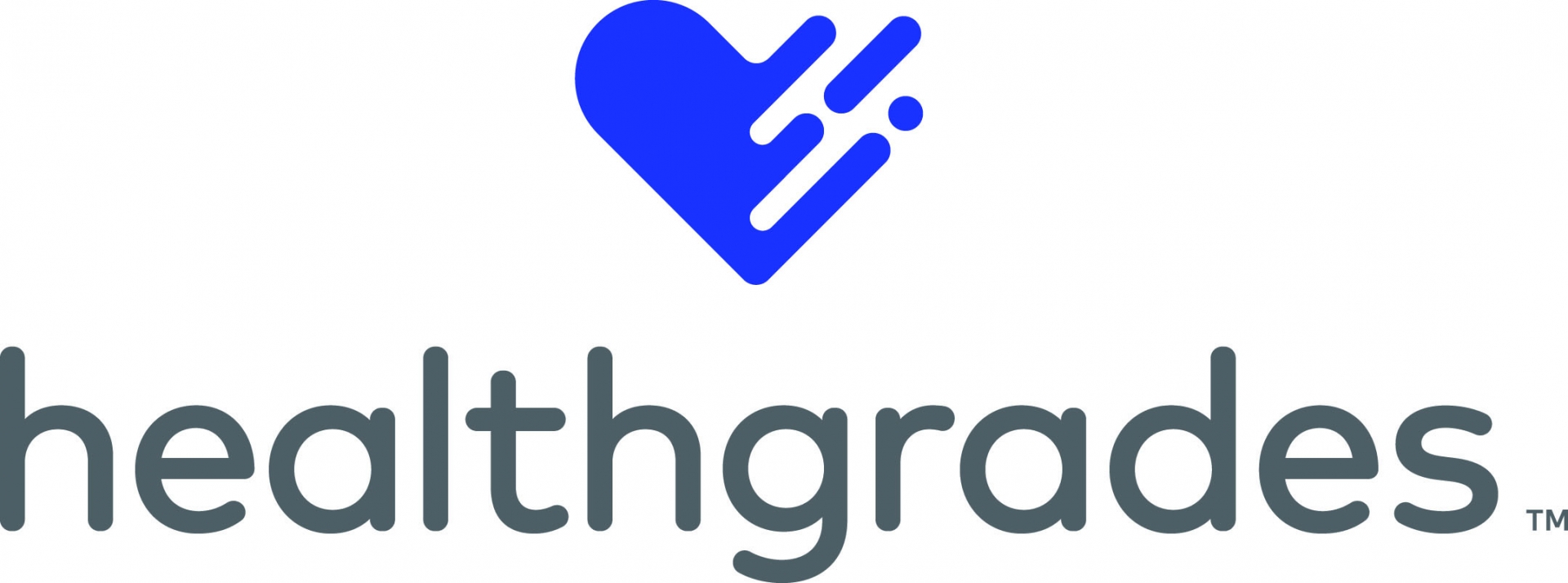 |
| Photo: Healthgrades |
Healthgrades Operating Company Inc., known as Healthgrades, is a US company that provides information about physicians, hospitals and health care providers. Healthgrades has amassed information on over 3 million U.S. health care providers. The company was founded by Kerry Hicks, David Hicks, Peter Fatianow, John Neal, and Sarah Lochran, and is based in Denver, Colorado. Rob Draughon serves as the company's CEO. According to USA Today, Healthgrades is the first comprehensive physician rating and comparison database. The application is part of a trend in health technology in the United States towards consumer-driven healthcare.
Healthgrades evaluates hospitals solely on risk adjusted mortality and in-hospital complications. Its website evaluates roughly 500 million claims from federal and private reviews and data to rate and rank doctors based on complication rates at the hospitals where they practice, experience, and patient satisfaction. Its analysis is based on approximately 40 million Medicare discharges for the most recent three-year time period available. Hospital rating reports for specific procedures and diagnoses are compiled primarily from Medicare claim data, and include all hospitals that are Medicare participants. Some critics argue that claim data is not adequate enough to make determinations about the quality of care and that conclusions should be drawn from medical records. Peer-reviewed research has shown that measures of mortality and complication rates based on administrative data can be used as a measure of clinical quality. Ratings are updated yearly, but data is two years old before Medicare releases it.
Healthgrades develops objective ratings based on data and information obtained from several sources, mostly available to the public. The data is analyzed using a proprietary methodology that identifies the recipients of the various awards and the "1-3-5 Star" designation. Specifically, most ratings are determined from multivariate logistic regressions of medical outcomes at a given healthcare provider to risk-adjust the patients and 1-, 3- and 5-star awards are given to providers whose negative outcomes are worse than expected, near predicted levels, and better than expected, respectively. The ratings have been criticized for oversights in the methodology that may actually penalize some institutions with ideal medical outcomes. Nash et al. have expressed "concern about the reliability and validity of such 'black box' rating scales."
In addition to star ratings, Healthgrades recognizes facilities for: America's 50 and 100 Best Hospitals, Distinguished Hospitals for Clinical Excellence, and Excellence Awards in 26 areas. The Clinical Excellence awards bestowed by Healthgrades are intended to help patients make an informed choice about where to get treated.
11. Psychology Today
Psychology Today is a media organization with a focus on psychology and human behavior. The Psychology Today website features therapy and health professionals directories and hundreds of blogs written by a wide variety of psychologists, psychiatrists, social workers, medical doctors, anthropologists, sociologists, and science journalists. Psychology Today also publishes a bimonthly magazine, which first appeared in 1967.
Psychology Today is among the oldest media outlets with a focus on behavioral science. Its tagline is “Here to Help” and its mission is to cover all aspects of human behavior so as to help people better manage their own health and wellness, adjust their mindset, and manage a range of mental health and relationship concerns.
Psychology Today content and its therapist directory are found in 20 countries worldwide. Psychology Today's therapist directory is the most widely used and allows users to sort therapists by location, insurance, types of therapy, price, and other characteristics. It also has a Spanish-language website.
The print magazine's circulation is 250,000, with 15.02 readers per copy, totaling an audience of 3.75 million.
Psychology Today has a social media presence with 7.5 million Facebook followers, more than 900,000 Twitter followers, more than 600,000 Instagram followers, and more than 700,000 LinkedIn followers as of March, 2022.
The Psychology Today website, in addition to archiving magazine articles since 1992, features a continuous stream of blogs by laboratory researchers, clinical practitioners, and writers with a broad range of expertise. Daily reports of the findings of new research on human behavior accompany accounts of common concerns and explorations of the impact of current events on mental health. The website is also the primary portal to a comprehensive directory of psychologists, psychiatrists, and other mental health professionals in the U.S. and around the world. The New York Times recommends this therapist finder when considering the costs involved in seeking therapy.
12. Livestrong
Livestrong.com is a well-known fitness website. The editorial staff includes a wide range of expertise, including journalists and data analysts who perform appropriate research for the article content. You can trust that the fitness and dietary advice and tips will be grounded in solid research.
Top features:
A solid library of informative articles on nutrition, fitness, and weight loss
Fitness challenges and 20-minute workout plans to get started quickly
A Live Well section focused on promoting healthy living and avoiding disease
A newsletter where you can get fitness and health tips in your email inbox
The Livestrong Foundation is a United States nonprofit organization that provides support for people affected by cancer. The foundation, based in Austin, Texas, was established in 1997 by cancer survivor and former professional road racing cyclist Lance Armstrong, as the Lance Armstrong Foundation. The Livestrong brand was launched by the foundation in 2003. Armstrong resigned from the foundation in 2012 after his admission of doping, leading to the rebranding of the entire organization as Livestrong Foundation.
Among its activities, the foundation lobbies governmental agencies, conducts research on cancer survivors, and funds a number of smaller non-profit organizations. The cornerstone of the foundation's work was the providing of free, direct, personalized support services for people navigating the physical, practical, emotional and financial challenges of having cancer. In this effort, the foundation aimed to make the cancer care system more patient-focused. As of 2020, the foundation has shifted its focus away from "direct services", and has positioned itself as a backer of companies involved in improving patient care.
13. Medscape
Medscape is a website providing access to medical information for clinicians; the organization also provides continuing education for physicians and health professionals. It references medical journal articles, Continuing Medical Education (CME), a version of the National Library of Medicine's MEDLINE database, medical news, and drug information (Medscape Drug Reference, or MDR). At one time Medscape published seven electronic peer reviewed journals.
Medscape launched May 22, 1995 by SCP Communications, Inc. under the direction of its CEO Peter Frishauf. In 1999, George D. Lundberg became the editor-in-chief of Medscape. For seventeen years before joining Medscape he had served as Editor of the Journal of the American Medical Association.
In September 1999, Medscape, Inc. went public and began trading on NASDAQ under the symbol MSCP. In 2000, Medscape merged with MedicaLogic, Inc., another public company. MedicaLogic filed for bankruptcy within 18 months and sold Medscape to WebMD in December 2001. In 2008, Lundberg was terminated by WebMD. The following year the Medscape Journal of Medicine ceased publishing. In January 2013, Eric Topol was named editor-in-chief of Medscape. The same year, Lundberg returned to Medscape as editor-at-large.
In 2009, WebMD released an iOS application of Medscape, followed by an Android version two years later. In 2015, WebMD launched Medscape CME & Education on iOS.
14. Nutrition.gov
The USDA provides its own nutritional website called Nutrition.gov. This website offers valuable science-based information about nutrition that you can depend on. This includes nutrient databases from the USDA, articles about food and diet, advice on preventing disease and illness, and even seasonal recipes.
Top features:
- Government-run and funded, so its motivation is to serve the public
- Expert Q&A section that helps clear up misinformation and confusion
- References to other government resources for more information
- An entire section devoted to healthy recipes
15. Harvard: The Nutrition Source
One of the best places to ensure that the nutritional information you’re getting is evidence-based is from an academic institution. This is exactly what you’ll get at The Nutrition Source, published by the School of Public Health at Harvard. For example, in its list of healthy protein sources, The Nutrition Source listed fish, poultry, beans, and nuts – not beef. This is a sign that major industries do not influence the resource.
Top features:
- Includes a downloadable Healthy Living Guide PDF that you can keep with you wherever you go
- Provides macro sections (carbohydrates, protein, fats) to help you make more educated food choices
- Includes an extensive recipes section
 Best Free Sites to Watch Liverpool vs Villarreal Online Anywhere in the World Best Free Sites to Watch Liverpool vs Villarreal Online Anywhere in the World Liverpool vs. Villarreal meet in the UEFA Champions League semi-final first leg at Anfield on April 27. Find out the best FREE websites to watch ... |
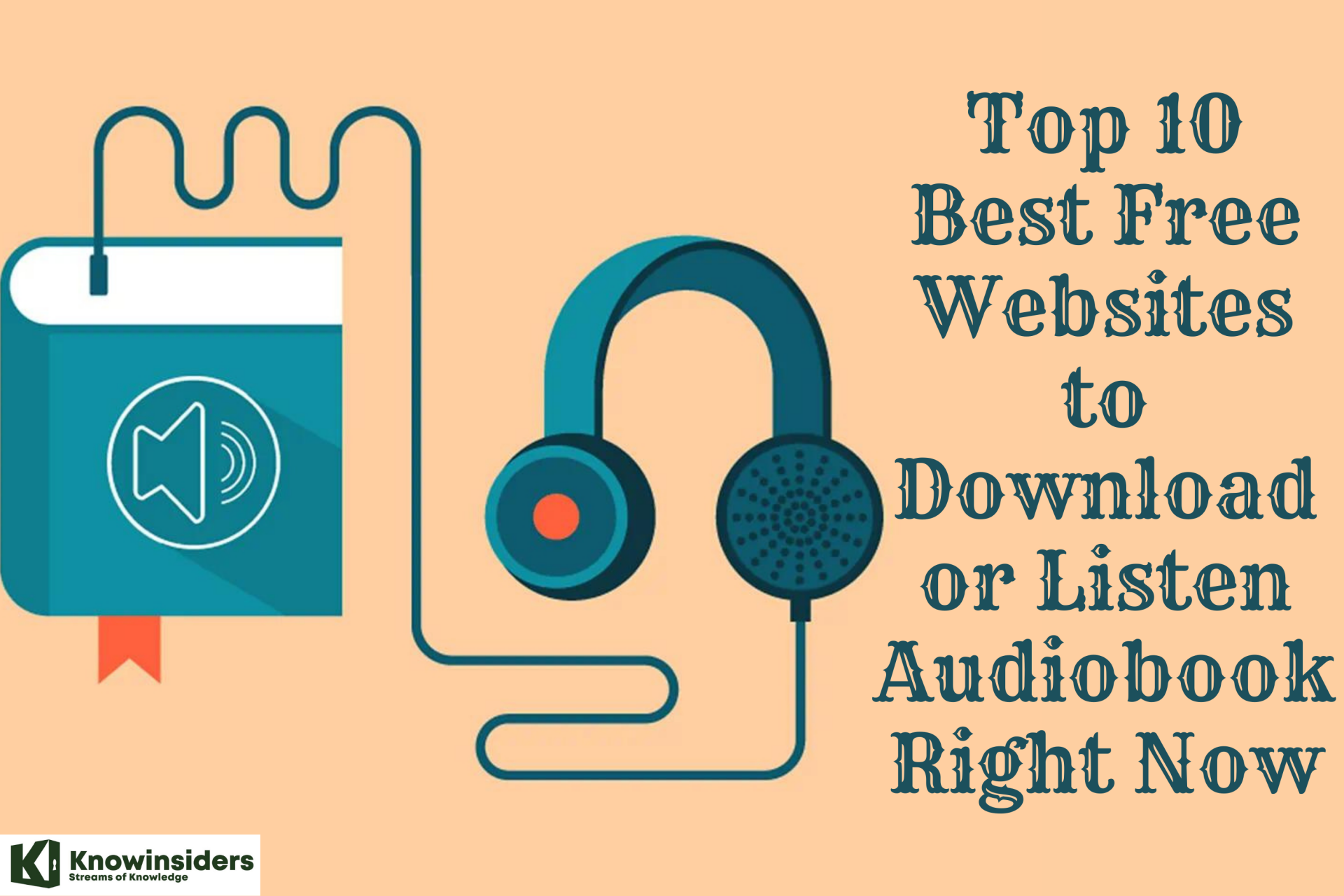 Top 10 Best Free Websites to Download or Listen Audiobooks Right Now Top 10 Best Free Websites to Download or Listen Audiobooks Right Now If you’re a bookworm, getting audiobooks for free that you can download and listen to can save you a lot of money. Thankfully, these are ... |
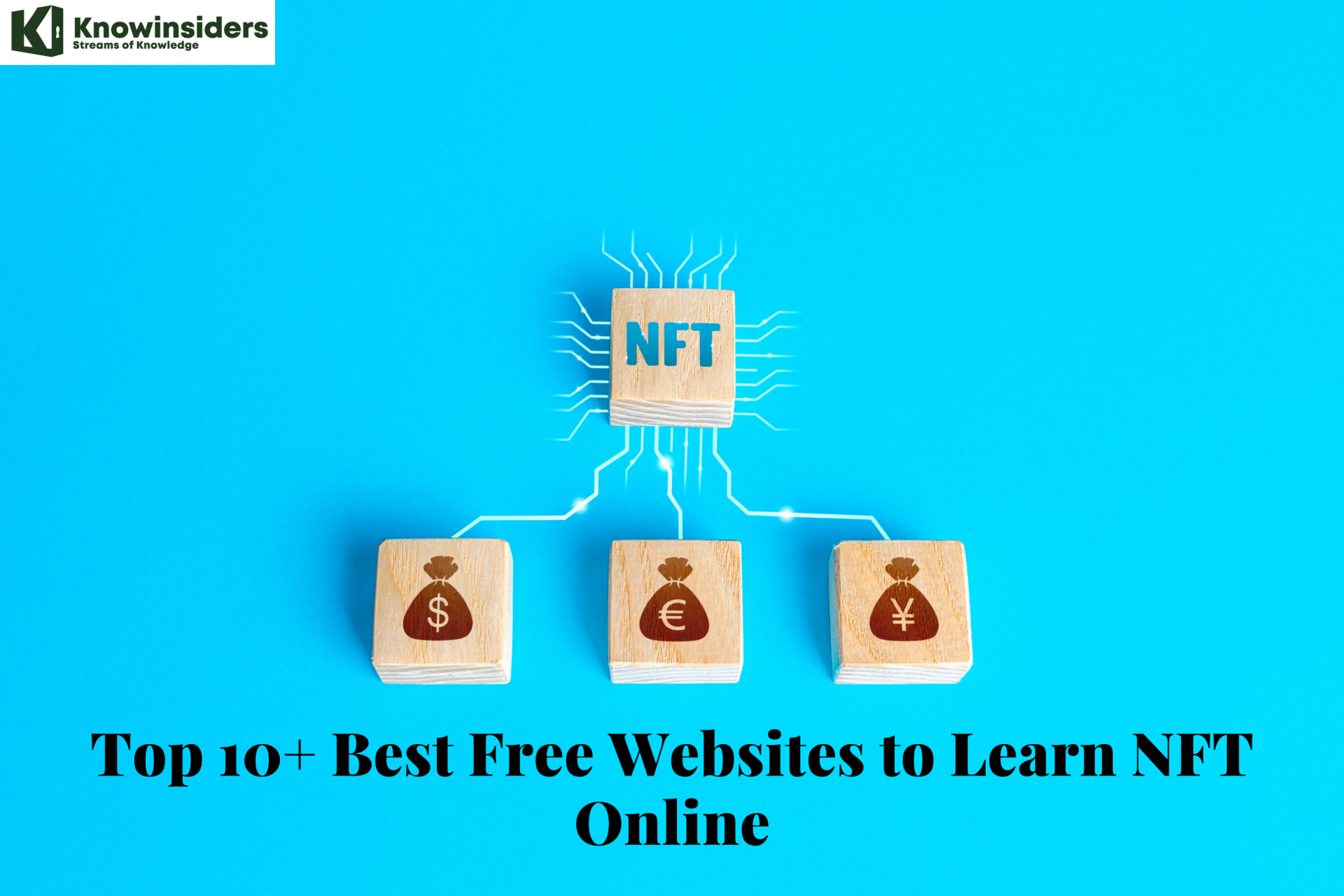 Top 10+ Best Free Websites to Learn NFT Online and Earn Money Right Now Top 10+ Best Free Websites to Learn NFT Online and Earn Money Right Now Learn NFT with the best 10 free NFT tutorials and online courses free in this post right now! |
 Top 10+ Best Free Sites to Check the U.S Weather Forecast Online Top 10+ Best Free Sites to Check the U.S Weather Forecast Online There are plenty of weather websites that offer basic and detailed forecasts. These websites will not just allow you to stay updated with the weather ... |



